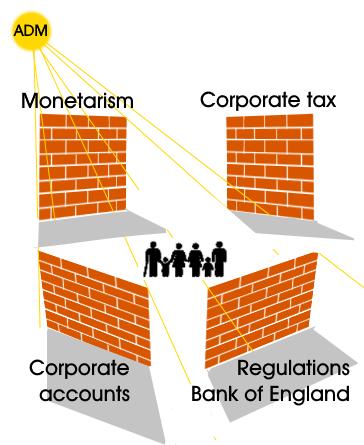RIO and Locational State Theory
Rational laws and regulations
Hector McNeill1
SEEL
In the last article entitled, "RIO and Locational State Theory - The evolving dualistic disequilibrium", I stated that many of the problems associated with a economic marginalization of the majority are buttressed by laws and regulations which need to be nullified and replaced with more rational laws and regulations. In this article I provide some examples. |
The will of the people
Theoretically, our democracy provides the public with two important means of imposing checks and balances on the conduct of governments and the laws and regulations they develop. These are the general election and the jury which, in its ability to nullify laws, has a fundamental role to ensure laws are applied fairly. Where circumstances of a case do not warrant the current legal sanction, a jury can, based on the assessment of the evidence and of the arguments exchanged, declare the defendant "not guilty" where they consider the accused to not have transgressed the law but was pursuing ends considered to be reasonable, and nullify the law. This often occurs where legislation has not "covered" the circumstances of the case in point (see,
"RIO-Real Income Objective - Rights and expectations - a note"). Where governments have not performed well, the voters have the option to elect other people, probably from different political parties, to form a government to replace the previous government. However, in spite of the rhetoric and media content, all parties in the United Kingdom rely on the same economic theories of Keynesianism, monetarism and supply side economics, so-called. Therefore election outcomes that result in a change in political party dominance are not going to bring about fundamental changes in the policy instruments applied nor in any of the basic legislation and regulations. However, no one has attempted to sue the government for damages arising from economic policies and the assortment of legislation and regulations before a jury. It is worth exploring which laws and regulations would be worth nullifying and replacing them with something better. We are of course, in such an analysis, appealing here to the community conscience to assess what might be considered to be reasonable expectations of the outcomes of policies and which outcomes transgress what people would consider to fall outside the expectations of reasonable intent by policy makers. One needs to also consider the competence of certain individuals to occupy positions of state where such decisions are taken.
In the previous sentence I refer to "
reasonable expectations of the outcomes of policies", in the sense that it should not be the case the decisions on policy will knowingly prejudice segments of the constituency. If so, this would point to bad faith and discrimination on the part of politicians. Politicians, as we are told, are voted in to serve the people. But based on the last few articles in this series, we know that politicians act in service of their political party, their benefactor. In turn, political parties mould policies to favour their own benefactors. There is therefore a dependency that results in politicians favouring policies that discriminate against those segments of the constituency whose interests differ from those of party benefactors. The political party benefactors are few in number when counted not as corporations but as individual constituent. Therefore political parties who operate on this basis can never address the gaps and needs of the majority. Clearly this type of behaviour needs to be curtailed but it is important to pinpoint the laws, regulations and institutions which support this behaviour which continues with impunity.
Cognitive ergonomicsThe policy straight jacket
 |
One of the fundamental concepts in the communication of ideas or policies is to break topics down into intelligible segments. In this way it is possible to take a complex topic and end up communicating the key segments and it is remarkable how people can then string the separate parts together to grasp the implications of the separate segments, taken as a whole. This technique of cognitive ergonomics is based on advancing the details of important topics in such a way as to not overload the listener but to enable a practical rate of assimilation so as to end up with a transfer of knowledge and measurable advances in understanding. In terms of the interests of the majority it is notable that topics of significance to the determination of their real incomes are not topics that enter into the realms of point of discussion between politicians and constituents. Four topics which many do not consider to be issues of concern to the "man in the street" are monetary policy, corporate taxation, corporate accountancy regulations and financial regulations and Bank of England decisions. These remain the preserve largely of political party benefactors all of whom follow the Aggregate Demand Model (ADM), the totem pole of Keynesianism, monetarism and supply side economics and the emerging modern monetary theory. Although these "topics" remain beyond the realms of political party manifestos, parliamentary discussions and other policy fora, each has a significant constraining influence on the advancement of real incomes of the majority and real economic growth in general because each generates perverse incentives.
The illustration on the right places each of these "topics" as walls, behind which the constituents are unable to participate in policy formulations. The majority of the constituency exists in a straight jacket represented by these four barriers. The following segments explain why each of these topics should be "on the tables" of any serious discussions on the future of economic policies to improve the general state of the economy and to reduce income disparity. They also need to be reviewed in terms of the perverse incentives each promote to the detriment of the majority. These pillars of the ADM temple can be pushed aside or altered to create a better way forward.
Monetarism
With the introduction of quantitative easing (QE) following a disastrous failure of the monetarism model in 2008, the insistence on imposing yet more monetarism through QE has exacerbated the state of affairs. Investment in higher productivity production and services has declined, productivity has declined, as have real wages. There has been a massive inflation in asset prices whereas the purchasing power of the currency in the transactional markets for goods and services has only declined slightly. As a result the purchasing power of asset holders has increased roughly in proportion to the inflation that has occurred in asset markets. In the meantime inflationary leakage from the real estate and land market has passed into the goods and services market segments through steep rises in prices and rents of land, housing, farmland, industrial premises, warehouses and office accommodation and vehicle parking fees.
The incentive perversityThe "justification" for QE put out by the governments, the Bank of England and others was that it would result in an increase in investment in higher productivity activities and banks would be able to build up their balance sheets. The Quantity Theory of Money (QTM), the mainstay explanation for monetary theory, however, could not explain the outcome. This was because this model is flawed. It does not include savings or assets. We replaced the QTM with a workable model, a
Real Money Theory, which can be used to explain why QE reduced real incomes as a direct result of banks channeling cheap money through clients, as well as on their own account, into assets leading to a depression in goods and services sectors. So the perverse incentive was that it was more profitable to "invest" in static assets such as land, real estate, gold and other precious metals or force up share prices through share buy backs. This resulted in a draining of resources form necessary investment in productive activities and a general depression in real incomes of the majority.
Corporate tax
Quite often, politicians with a particular viewpoint argue for lower corporate taxation as a means of improving the performance of the "economy". The general argument designed, it would seem, for gullible constituents desirous of a performant economy because they presume they might benefit, is that by raising profits there will be more investment in higher productivity production from which all will benefit. This mantra concerning the benefits of low corporate taxation has become increasingly repetitive since the late 1970s. It took on an additional impulse under Reagan when so-called supply side economic was introduced as a part of policy which included marginal reductions in high rate taxation as well as across the board reductions. However, because inflation at that time was caused by cost-push effects starting with the international rise in international petroleum prices in the mid-1970s there was, indeed, a need for investment in petroleum and petroleum derivative input substitution technologies. However, although there was a marginal improvement in productivity and eventually inflation came down. This was not the result of any tax breaks but was brought about by the raising of interest rates to 20% leading to widespread house repossessions and families losing their farms. In general none of these changes filtered through into rises in the real incomes of the majority of wage earners.
The incentive perversityIn summary, reductions in corporate tax rates seldom result in any significant rises in productive investment and most of the benefit flow in the direction of shareholders and executives of corporations as well as the service sectors that support this small faction of the constituency. The majority of the constituency do not benefit.
Corporate accountancy regulations
Corporate accounts come under a range of laws and regulatory standards setting out the procedures to be followed in drawing up balance sheets and accounts and the estimate of corporate tax due.
The human resources associated with a company are divided into several categories as external shareholders, owners, executives and labour force. Progressively, the labour force has become the only human resource component to be classified as an exclusively cost item. Gross profits are corporate revenue (income) minus costs, therefore wage earners exist as a component in tension with profits. With inflation, there is always pressure to raise wages to compensate whereas this always faces resistance from management. Since management has aimed to maintain the real value or profits and shareholder dividends and whereas inflation driven by input prices is often not negotiable then wages tend to come low down the list of priorities for adjustment. As a result, over the last 30 years profit has a percentage of GNP have risen steadily while wages have fallen.
The incentive perversityCorporate accountancy law and regulations covering norms are legally enforceable and place work forces at a disadvantage in terms of their receiving a compensation for real income declines caused by inflation.
Financial regulations and Bank of England decisions
Financial policy decisions that fall within the ambit of the Bank of England have been lax because of their failure to achieve what was promised. The decision to introduce QE as a basis for stabilizing the economy and securing growth on the assumption of investment for higher productivity to be encouraged through close-to-zero interest rates did not result in any such effect. What was supposed to be a short to medium term initiative to, "...help banks strengthen their balance sheets" has turned into a prolonged decade long disaster of intensifying flows of funds into assets and witnessing the fall in investment, productivity and real wages. Financial regulations place no obligations on banks to support productive investment in spite of the fact banks are receiving money, virtually for free.
There is a tendency for the Treasury and the Bank of England to play a particularly banal act with the government shrugging its shoulders in relation to Bank of England decisions, placing particular emphasis on the fact that the Bank is "independent". The Bank, well aware of the unmitigated disaster of QE and now the impacts of Covid-19 serving to expose the result of these failed policies in the form of a population with almost no savings and living day by day depending on low wages. The Bank officials repetitively intone the importance of maintaining the Bank's "independence".
The incentive perversityThe Bank of England was made independent by Gordon Brown because he has observed the impact of government control over interest rates being a significant factor in the downfall of the Thatcher government. As a defence mechanism, his first act was to make the Bank "independent" so as to shift decisions on monetary matters "offshore" from Whitehall to the City. In reality the Treasury and Bank of England work so closely together that this notion of independence is academic. However, the perversity of this arrangement is that governments can obfuscate matters and avoid accountability for QE by insisting that it was a Bank of England decision or at most, a joint decision. Either way, the outcome was a continuation of the marginalization of the majority of constituents.
The RIO-Real Income Objective perspective on solutions
A foundation of freedom, democracy and the rule of law is that each should be allowed to pursue their objectives while not preventing others from doing the same. The laws and regulations upon which all agree should be geared towards sanctions against those who fail to uphold this basic tenet of freedom by, for example, preventing others from attaining their objectives. In addition a range of legitimate objectives would also exist to separate these from objectives that are harmful to others or to the environment and other considerations. We refer here to a framework that prevents discrimination against any group of any number. However, under our current legal frameworks that oversee economic policies, we find that policies such as QE, discriminate against an increasing proportion of the constituency by causing a decline in the their real incomes while at the same time, the very same policy has greatly enhanced the rate of increase in the real incomes of a minority. This is caused by the perverse incentives that policies and norms have created, such as cheap money flowing into assets, the increases in incomes of shareholders, managers, owners and profits taking precedence over any rises in wages and a situation of isolation of wage earners, consolidated by accountancy regulations.
ExternalitiesArthur Pigou, in his work on welfare economics provided ways to analyse and through policy provisions counter the exernalities that depress welfare that result from economic activities, such as pollution. However, under the ADM operation most of the negative impacts on the constituency arise from the economic policies and the supportive laws and regulations. RIO-Real Incomes Objective development was initiated in 1975 for this reason. Conventional economic policies, at that time, possessed no policy instruments to address slumpflation that did not impose unacceptable prejudice on the majority. Now, 45 years later economic theory and applied policies have not advanced in a fashion to counter this problem. Conventional economic policies continue to generated winners, losers and those who remain in an apparent neutral policy-impact state. The significant oversight in economic analysis is that for some reason there is a belief that centralized arbitrary impositions in markets for money and interest rates and levying arbitrary taxes, is a way to manage an economy made up of millions of companies and constituents all facing completely different conditions. Even without attempting to build a determinant model to trace the impacts of a one-size fits all policy instrument target values, it is self-evident that the impact will involve significant differentials in terms of outcomes for different companies and constituents. However, because the policy directives are motivated by the interests of a very small relatively homogenous financial and asset holding sector, it is not surprising to find that this sector tends to be amongst the winners.
Politics with no partiesPolitical parties have very little leeway to respond to these realities because their fundamental survival rests in the hands of their benefactors. There is therefore a need to increase the awareness of the constituents of this reality. It is often the case that those who have voted for a particular party because they have believed its rhetoric, have the most to lose in sustaining their support for that party. It would seem that this is the case today with lower income and marginalized wage earners in specific constituencies who recently switched their allegiances. However, so far, policies have not changed and most of these voters are going to be disappointed. Covid-19, of course has exacerbated the state of affairs as a result of constraints on work related to social distancing and now, as a result of falls in demand as a result of falls in incomes, many of these hopefuls will join the ranks of the unemployed.
The Chancellor's "give aways" are late in the day attempts to fixed structural problems created over the last 50 years by both major parties in government. However, as policy continues into a slow recovery, most of these "give aways" will be replaced by loans heralding a downwards spiral combining rises in income taxation of an increasingly impoverished nation.
1 Hector McNeill is the Director of SEEL-Systems Engineering Economics Lab.
All content on this site is subject to Copyright
All copyright is held by © Hector Wetherell McNeill (1975-2020) unless otherwise indicated